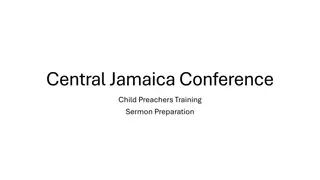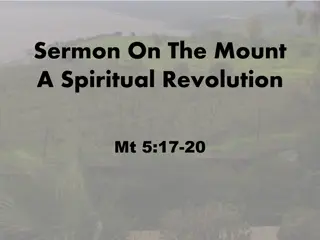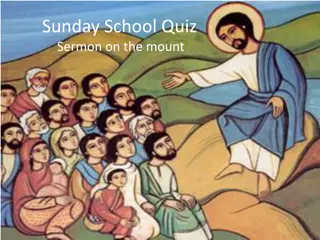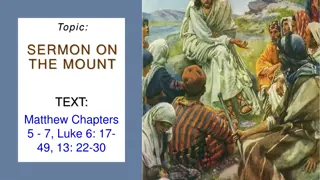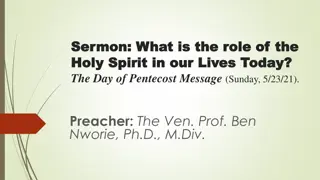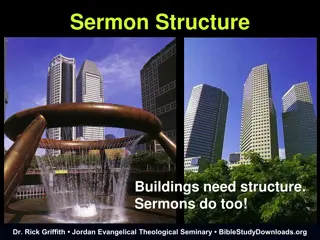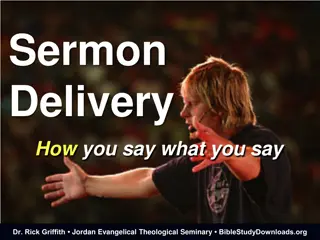
Jesus' Approach to Poverty and Wealth in His Ministry
Explore how Jesus interacted with the poor, the rich, and individuals from various socioeconomic backgrounds during His earthly ministry. Reflect on the implications for modern-day churches in ministering to both the rich and the poor without distinction, drawing insights from Jesus' teachings and actions.
Download Presentation

Please find below an Image/Link to download the presentation.
The content on the website is provided AS IS for your information and personal use only. It may not be sold, licensed, or shared on other websites without obtaining consent from the author. If you encounter any issues during the download, it is possible that the publisher has removed the file from their server.
You are allowed to download the files provided on this website for personal or commercial use, subject to the condition that they are used lawfully. All files are the property of their respective owners.
The content on the website is provided AS IS for your information and personal use only. It may not be sold, licensed, or shared on other websites without obtaining consent from the author.
E N D
Presentation Transcript
A Question to Ponder How did Jesus relate to the poor whom He came across during His earthly ministry?
Another Question to Ponder Do you think, as the church in 2024, we like to make distinctions in our ministry activity between the rich and poor? Do we practice a kind of ministry to the poor and a radically different kind of ministry to the rich?
The Spirit of the Lord is on me, because he has anointed me to proclaim good news to the poor. He has sent me to proclaim freedom for the prisoners and recovery of sight for the blind, to set the oppressed free, to proclaim the year of the Lord s favor. (Luke 4:16-19) Does Jesus mention this because His mission was only to the poor, the imprisoned, the blind, the oppressed and those not experiencing God s favour? Is there perhaps a way to understand that we are all impoverished, imprisoned, blind, oppressed and out of God s favour in some way?
Christs physical provision and His spiritual provision to the poor go hand in hand; Jesus provision for physical needs is bundled with the proclamation of Jesus as Lord. Christ gave himself for us to redeem us from all wickedness and to purify for himself a people that are his very own, eager to do what is good (Titus 2:14). In Christ, not in cash, are our deepest needs met!
It is undeniable however that part of what it means to be a people eager to do what is good means care for and generosity towards those who face financial hardship. Though part of the good news to the poor is that encouraged generosity will ease their financial burden, I would suggest that Christ s concerns ran much deeper. Was Jesus establishing a kingdom in which preference is shown towards those with greater financial means? Might we find echoes of this thinking in the church in 2024?
Poverty and Wealth in the life of Christ Although understanding Jesus as desperately poor is likely a stretch, indicating that Jesus was acquainted with poverty is far more accurate. The gospels record that Jesus identified with, ministered to and interacted with many wealthy and powerful individuals, including people like Joseph of Arimathea, Nicodemus, Zacchaeus, and certain unnamed Pharisees from among the ruling class.
After this, Jesus traveled about from one town and village to another, proclaiming the good news of the kingdom of God. The Twelve were with him, and also some women who had been cured of evil spirits and diseases: Mary (called Magdalene) from whom seven demons had come out; Joanna the wife of Chuza, the manager of Herod s household; Susanna; and many others. These women were helping to support them out of their own means. (Luke 8:1-3) Among His closest followers, we find both the poor and the rich! As evidenced by the makeup of His circle, Jesus did not show preference for the wealthy; instead, He equally incorporated the have nots . Might part of the good news be that even in light of their poverty, the poor are now not only included, but specifically included in the kingdom of God?
Within His ministry, Jesus seems not to have shaped His ministry approach based solely upon the financial position of those He engaged. Regardless of the condition of our bank account, we are God s craftsmanship and as such, we require ongoing provision from our Maker and sustainer. Both the rich and poor desperately require provision, in varying degrees and in a multitude of ways from Jesus Christ and in a very unique way, Jesus served as the bread of life , meeting the physical and spiritual needs of both the rich and the poor.
Jesus did not come that all poor people might see their financial situations changed immediately, but I do believe that Jesus very clearly envisioned that through the community of the people of God, the poverty experienced by brothers and sisters in Christ would be addressed by those from a more wealthy background. Out of the overflow of generosity experienced within the church, the surrounding community would also see poverty generously addressed. As followers of Jesus, we ought to be inclined to meet the needs of the poor because we have been changed by the gospel!
This is how we know what love is: Jesus Christ laid down his life for us.And we ought to lay down our lives for our brothers and sisters. If anyone has material possessions and sees a brother or sister in need but has no pity on them, how can the love of God be in that person? (1 John 3:16-17) I am not commanding you [to be generous], but I want to test the sincerity of your love by comparing it with the earnestness of others. For you know the grace of our Lord Jesus Christ, that though he was rich, yet for your sake he became poor, so that you through his poverty might become rich. (2 Corinthians 8:8-9)
Our willingness to meet the physical/financial needs of others therefore, points not only to the sincerity of our love for Christ, but also serves as the righteous response for the richness of our standing in Christ, due to His willingness to embrace poverty. The point of the generous meeting of needs within the greater church then is as Paul says to allow [our] plenty [to] supply what they need, so that in turn their plenty will supply what [we] need. The goal is equality (2 Corinthians 8:14). Followers of Jesus ought to pursue reciprocity in generosity, so that nothing is lacking within the body of Christ! This is imprecisely what we learn occurred within the early church.
A Conclusion From the ministry of Jesus and the service of the early church, we can learn that: 1. we ought to serve those of lesser means in love, desiring to enjoy their inclusion in and contributions to the body of Christ, because we humbly understand the way Christ has graciously and generously met our own poverty. 2. we ought not serve the poor to the neglect of the affluent, instead seeking ways to ensure that ministry is equally shared within the church between the wealthy and the impoverished. 3. as we meet physical needs, so too must we ensure that gospel proclamation is part and parcel of our activity.
Application Might we pray that God changes our hearts by His good news so that we respond appropriately to issues of wealth and poverty in our world. Might we focus on the meeting of needs among both the rich and the poor, both in the church and outside the church, doing so while powerfully proclaiming that such generosity is only possible due to divinely changed hearts and as evidence of Christ s kingdom come . Might the generosity we see in action within this church be that from a positon of wealth or through the gift of a widow s mite - result in the completion of the good works Christ has laid out for us.
Give me neither poverty nor riches, but give me only my daily bread.Otherwise, I may have too much and disown you and say, Who is the LORD? Or I may become poor and steal, and so dishonor the name of my God (Psalm 30:8-9).




